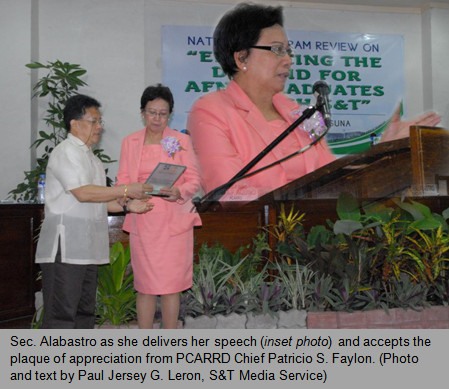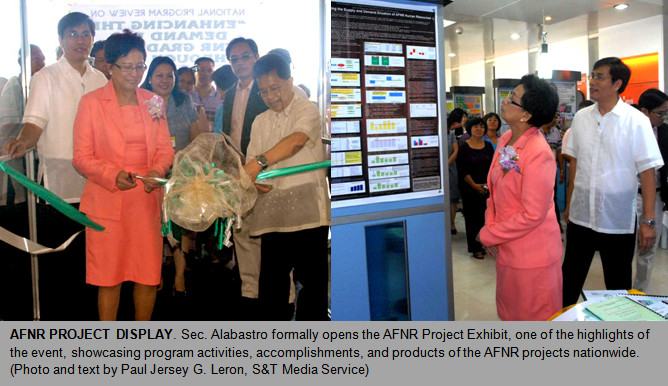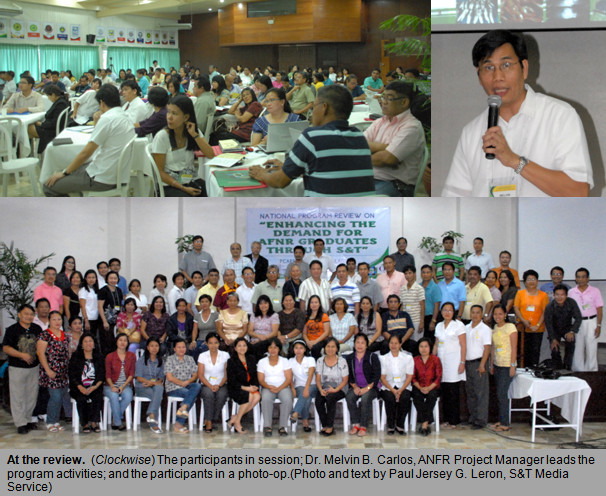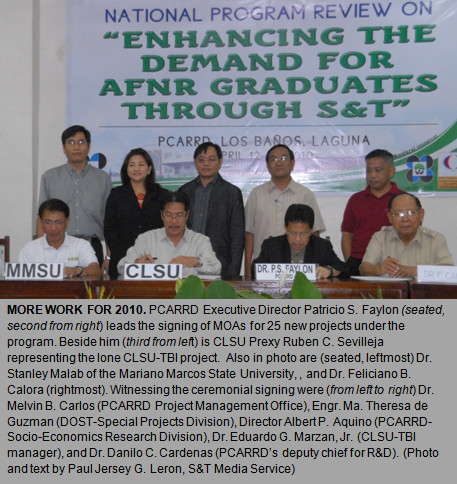 Los Baños, Laguna ─ “No other project and program of PCARRD has covered so many SUCs (state universities and colleges) and provinces in the country as this one big undertaking.
Los Baños, Laguna ─ “No other project and program of PCARRD has covered so many SUCs (state universities and colleges) and provinces in the country as this one big undertaking.
For this I commend the PCARRD management for accepting and taking this challenge,” Department of Science and Technology Secretary Estrella F. Alabastro said referring to PCARRD’s running of the program “Enhancing the demand for AFNR (agriculture, forestry and natural resources) graduates through science and technology (S&T).”
Alabastro was the guest speaker during a national review of the program held recently at the PCARRD Headquarters. 
Launched in 2008, the P200-million AFNR program aims to understand the factors driving the supply and demand of human resources in the AFNR sectors and provide direct interventions to capacitate SUCs; and improve the employability and entrepreneurial potential of AFNR graduates. It is funded by DOST and coordinated by PCARRD and DOST allied agencies; and implemented by SUCs under the National Agriculture and Resources Research and Development Network. 
The program review
The review gathered the SUC implementers all over the country. It was conducted to: 1) Present results of Component 1, which is on the current and future state of supply and demand of AFNR in the country; 2) Assess the overall progress of Component 2 on institutional capability activities; 3) Evaluate Component 3 accomplishments with respect to educational-income generating projects (e-IGPs), technopreneurial learning projects (TLPs), and DOST-Academe Technology-Based Enterprise Development (DATBED); and 4) Address concerns and challenges of the program in its last year of implementation.
One of the highlights of the review was the AFNR Project Exhibit that showcased the project activities, accomplishments, and products.
Although the plenary sessions were the main venues for the review of projects, equally important were the parallel sessions where technical experts helped in addressing specific sector and cross-regional issues and constraints of related projects. In both sessions, reviewers helped in formulating remedial actions to attain project targets. A concluding session was also held to explore various approaches to ensure the sustainability of program interventions.
 The final highlight of the review was the ceremonial signing of memoranda of agreement (MOA) between PCARRD Executive Director Patricio S. Faylon and 11 SUCs representing 25 new projects of the program that will commence in 2010. At the forefront is the P30-million project titled “Establishment and operation of the Central Luzon State University (CLSU)-Technology Business Incubator (TBI) to speed up commercialization and development of enterprises for agriculture and food-based technologies.” The TBI is one-of-its-kind and the single biggest project funded under the AFNR HR Program.
The final highlight of the review was the ceremonial signing of memoranda of agreement (MOA) between PCARRD Executive Director Patricio S. Faylon and 11 SUCs representing 25 new projects of the program that will commence in 2010. At the forefront is the P30-million project titled “Establishment and operation of the Central Luzon State University (CLSU)-Technology Business Incubator (TBI) to speed up commercialization and development of enterprises for agriculture and food-based technologies.” The TBI is one-of-its-kind and the single biggest project funded under the AFNR HR Program.
The program in review
The program has three major components: 1) Policy analysis on the state and future supply of and demand for AFNR graduates in the Philippines, 2) Institutional capability enhancement in key higher institutions in AFNR, and 3) Entrepreneurship and employment generating S&T-based AFNR development programs of selected higher educational institutions (HEIs).
Component Project 1 was completed in November 2009, while Component Projects 2 and Project 3 are still ongoing in 11 regions of the country.
By the end of 2009, under Component Project 2 - more than 117 AFNR facilities were enhanced and 732 equipment items were procured across 54 SUC beneficiaries. AFNR degree programs were also enhanced through the development of 95 entrepreneurship-orientated training modules, enrichment of 18 courses, and review or revision of 118 curricula. In less than a year, Components 2 and 3 trained a total of 1176 teachers, 2556 students, and 780 AFNR graduates.
For Component Project 3, more than 200 projects are now spread over 11 regions and 58 SUCs across the country. These comprise SUC-based techno-demo activities in crops, livestock, forestry, agricultural resources, and fisheries established to serve as show windows of sound S&T-based enterprise applications in the AFNR and “learning-while-earning” venues for students and graduates alike. In addition, student immersion activities in 19 e-IGPs, 91 TLPs, and 56 DATBED projects also commenced.
With the program’s coverage vis-a-vis accomplishments, Alabastro acknowledged that “indeed the program had gone a long way.” She lauded PCARRD and its partner SUCs for making significant efforts to achieve their targets and hopes that “in the end the program will be able to spark renewed interest in AFNR courses and improve the employability prospects of AFNR graduates by placing them in vital, strategic areas.”
